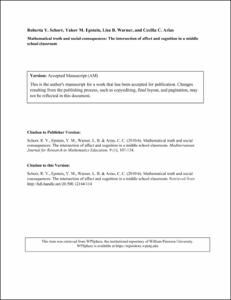Please use this identifier to cite or link to this item:
http://hdl.handle.net/20.500.12164/114Full metadata record
| DC Field | Value | Language |
|---|---|---|
| dc.contributor.author | Schorr, Roberta Y. | - |
| dc.contributor.author | Epstein, Yakov M. | - |
| dc.contributor.author | Warner, Lisa B. | - |
| dc.contributor.author | Arias, Cecilia C. | - |
| dc.date.accessioned | 2018-09-11T14:55:48Z | - |
| dc.date.available | 2018-09-11T14:55:48Z | - |
| dc.date.issued | 2010 | - |
| dc.identifier.citation | Schorr, R. Y., Epstein, Y. M., Warner, L. B. & Arias, C. C. (2010-b). Mathematical truth and social consequences: The intersection of affect and cognition in a middle school classroom. Mediterranean Journal for Research in Mathematics Education, 9 (1), 107-134. | en_US |
| dc.identifier.issn | 1450 -1104 | - |
| dc.identifier.uri | http://hdl.handle.net/20.500.12164/114 | - |
| dc.description.abstract | We focus on several groups of eighth grade students in an attempt to deepen our understanding of when, how, and why middle grade students engage in conceptually challenging mathematics. As part of our analysis, we have formulated the theoretical notion of engagment structures, which is a behavioral/affective/social constellation including characteristic patterns of behavior, indicative of affective pathways and models (structures) that have important cognitive interpretations and implications by the students. We report that students may be willing to abandon arguing for what they know are mathematical truths in order to avoid appearing weak or wrong in front of their peers, and this appears to be linked to the depth of their understanding and their social positioning within their groups. | en_US |
| dc.language.iso | en_US | en_US |
| dc.publisher | Cyprus Mathematical Society | en_US |
| dc.relation.ispartof | Mediterranean Journal for Research in Mathematics Education | en_US |
| dc.rights.uri | http://rightsstatements.org/vocab/InC/1.0/ | en_US |
| dc.subject | Affect | en_US |
| dc.subject | Engagement | en_US |
| dc.subject | Problem Solving | en_US |
| dc.subject | Mathematical Understanding | en_US |
| dc.subject | Urban Education | en_US |
| dc.subject | Education | en_US |
| dc.title | Mathematical truth and social consequences: The intersection of affect and cognition in a middle school classroom | en_US |
| dc.type | journal article | en_US |
| dc.description.version | Accepted Manuscript (AM) | en_US |
| Appears in Collections: | Education | |
Files in This Item:
| File | Description | Size | Format | |
|---|---|---|---|---|
| Schorr Epstein Warner Arias_2010b.pdf | Accepted Manuscript | 840.28 kB | Adobe PDF |  View/Open |
Items in DSpace are protected by copyright, with all rights reserved, unless otherwise indicated.
